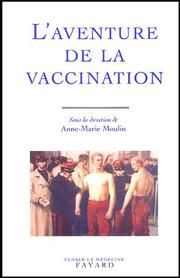| Listing 1 - 3 of 3 |
Sort by
|

ISBN: 2213594120 9782213594125 Year: 1996 Volume: *2 Publisher: Paris: Fayard,
Abstract | Keywords | Export | Availability | Bookmark
 Loading...
Loading...Choose an application
- Reference Manager
- EndNote
- RefWorks (Direct export to RefWorks)
Vaccination --- Communicable diseases --- Communicable Disease Control --- History. --- Prevention --- history. --- History --- Vaccination - History. --- Communicable diseases - Prevention - History. --- Vaccination - history. --- Communicable Disease Control - history.
Book
ISBN: 9782738131782 2738131786 Year: 2014 Publisher: Paris : Odile Jacob,
Abstract | Keywords | Export | Availability | Bookmark
 Loading...
Loading...Choose an application
- Reference Manager
- EndNote
- RefWorks (Direct export to RefWorks)
Quatrième de couverture : "Pour les Français, Louis Pasteur n est pas seulement celui qui a inventé les vaccins, il est aussi le père de la microbiologie. S ils connaissent le nom de Robert Koch, celui-ci n évoque pour eux que le bacille de la tuberculose. À l inverse, de l autre côté du Rhin, on ne retient de Pasteur que la découverte du vaccin contre la rage, alors que Koch est un héros national, découvreur des bactéries causant les maladies infectieuses les plus meurtrières. Une rivalité féroce a opposé ces deux savants.Nourrie, du côté de Pasteur, par un nationalisme exacerbé résultant de la défaite française lors de la guerre de 1870, et, pour Koch, de sa difficulté à s imposer face à un savant de vingt ans son aîné et bénéficiant d un immense prestige international. Mouvementée et violente, cette opposition, qui s est étendue aux écoles qu ils ont créées, n a pour autant pas été stérile, bien au contraire. Elle a conduit les savants français et allemands à se surpasser, accomplissant des uvres d une étonnante complémentarité. Grâce à eux, la plupart des maladies infectieuses qui décimaient jadis l humanité ont été vaincues."
Medical Laboratory Personnel --- Bacteriology --- Infectious Disease Medicine --- History, 19th Century. --- Microbiologists --- Communicable diseases --- Microbiologistes --- Bactériologie --- Maladies infectieuses --- Biography. --- history. --- Biography --- History --- Biographie --- Biographies --- Histoire --- Pasteur, Louis, --- Koch, Robert, --- History of Medicine --- Infectious Diseases --- Communicable Disease Control --- history --- Bactériologie --- Infectious Diseases - history --- Communicable Disease Control - history
Book
ISBN: 9780822961895 082296189X Year: 2012 Publisher: Pittsburgh University of Pittsburgh Press
Abstract | Keywords | Export | Availability | Bookmark
 Loading...
Loading...Choose an application
- Reference Manager
- EndNote
- RefWorks (Direct export to RefWorks)
"In 1976, the outbreak of a new strain of swine flu at the Fort Dix, New Jersey, army base prompted an unprecedented inoculation campaign. Some forty-two million Americans were vaccinated as the National Influenza Immunization Program hastened to prevent a pandemic, while the World Health Organization (WHO) took a wait-and-see approach. Fortunately, the virus did not spread, and only one death occurred. But instead of being lauded, American actions were subsequently denounced as a "fiasco" and instigator of mass panic. In Influenza, George Dehner examines the wide disparity in national and international responses to influenza pandemics, from the Russian flu of 1889 to the swine flu outbreak in 2009. He chronicles the technological and institutional progress made along the way and shows how these developments can shape an effective future policy. Early pandemic response relied on methods of quarantine and individual scientific research. In the aftermath of World War II, a consensus for cooperation and shared resources led to the creation of the WHO, under the auspices of the United Nations. Today, the WHO maintains a large and proactive role in responding to influenza outbreaks. International pandemic response, however, is only as strong as its weakest national link--most recently evidenced in the failed early detection of the 2009 swine flu in Mexico and the delayed reporting of the 2002 SARS outbreak in China. As Dehner's study contends, the hard lessons of the past highlight the need for a coordinated early warning system with full disclosure, shared technologies, and robust manufacturing capabilities. Until the "national" aspect can be removed from the international equation, responses will be hampered, and a threat to an individual remains a threat to all"--Provided by publisher.
Influenza, Human --- Communicable Disease Control --- History, 19th Century --- History, 20th Century --- History, 21st Century --- International Cooperation --- Pandemics --- prevention and control --- history --- Influenza, Human - prevention and control --- Communicable Disease Control - history --- Influenza, Human - history --- International Cooperation - history --- Pandemics - history --- Pandemics - prevention and control
| Listing 1 - 3 of 3 |
Sort by
|

 Search
Search Feedback
Feedback About UniCat
About UniCat  Help
Help News
News